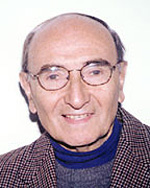Prize Recipient

Alberto Sirlin
New York University
Citation:"For their pioneering work on radiative corrections, which made precision electroweak studies a powerful method of probing the Standard Model and searching for new physics."
Background:Dr. Sirlin was born in Buenos Aires, Argentina.
During 1948-52 he studied at the University of Buenos Aires, and in 1953 received the degree of Dr. in Physical-Mathematical Sciences. In 1953 he was a fellow at the Centro Brasileiro de Pesquisas Fisicas in Rio de Janeiro, Brazil, where he attended some graduate courses, including a memorable one with Richard Feynman, and did research work.
During the academic year 1954-55 he studied at UCLA, where he initiated his work on electroweak physics in collaboration with Robert Finkelstein and Ralph Behrends. During the academic years 1955-57 Dr. Sirlin was a graduate student at Cornell, where he received the Ph.D. degree in 1958. Dr. Sirlin's main research work at Cornell was on electroweak physics, in collaboration with Toichiro Kinoshita. During the academic years 1957-59 he was a research associate at Columbia. Dr. Sirlin became an Assistant Professor of Physics at NYU in 1959, an Associate Professor in 1961 and a full Professor in 1968.
His main research interests have been in precision electroweak physics, other topics in weak interaction theory, the search for higher symmetries of the strong interactions, non-topological solitons, theorems on symmetry-breaking, some aspects of QCD, and the theoretical treatment of unstable particles.
He is a fellow of the American Physical Society. In 1983 he was awarded a Guggenheim fellowship and, in 1997, received the Alexander von Humboldt Award.
Selection Committee:
Elizabeth Simmons (Chair), Ann Elizabeth Nelson, Curtis Callan, Roberto Peccei, Estia Eichten
